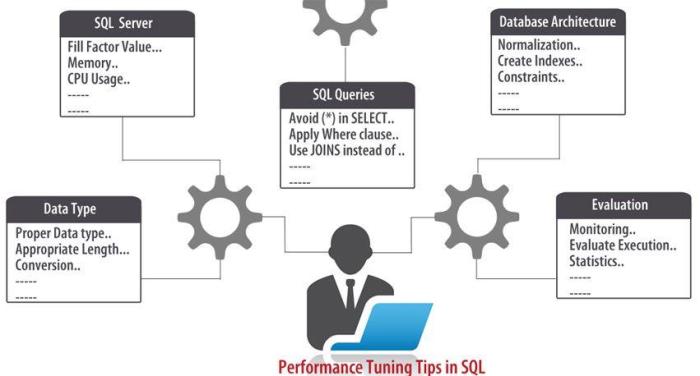SQL Server performance tuning interview questions demand a thorough understanding of the principles and techniques involved in optimizing SQL Server performance. This comprehensive guide provides an in-depth exploration of the subject, equipping you with the knowledge and insights to excel in your interviews.
Delving into the intricacies of performance tuning concepts, query optimization, index management, hardware and configuration, troubleshooting techniques, and scalability and high availability, this guide empowers you to tackle any SQL Server performance tuning interview question with confidence.
SQL Server Performance Tuning: Sql Server Performance Tuning Interview Questions

SQL Server performance tuning is the process of optimizing the performance of SQL Server databases to improve their speed, efficiency, and reliability. It involves identifying and resolving performance bottlenecks, optimizing queries, managing indexes effectively, configuring hardware and software settings, and implementing best practices.
Performance Tuning Concepts
The principles of SQL Server performance tuning include:
- Understanding the query execution plan and identifying areas for optimization.
- Identifying and resolving performance bottlenecks in queries.
- Measuring performance metrics such as response time, throughput, and resource utilization.
Query Optimization
Query optimization involves optimizing the execution plan of SQL queries to improve their performance. This includes:
- Using appropriate indexes to speed up data retrieval.
- Rewriting queries to use more efficient syntax.
- Optimizing the order of operations in queries.
Index Management, Sql server performance tuning interview questions
Indexes are data structures that speed up data retrieval in SQL Server. Effective index management involves:
- Creating indexes on appropriate columns.
- Maintaining indexes regularly to ensure they are up-to-date.
- Dropping unnecessary indexes to improve performance.
Hardware and Configuration
The hardware and software configuration of the SQL Server environment can significantly impact performance. This includes:
- Choosing the appropriate hardware components, such as CPU, memory, and storage.
- Configuring SQL Server settings to optimize performance.
- Monitoring and maintaining hardware resources to ensure optimal performance.
Troubleshooting Techniques
Troubleshooting SQL Server performance issues involves identifying the root cause of the problem and resolving it. This includes:
- Using performance monitoring tools to identify performance bottlenecks.
- Analyzing query execution plans to identify inefficient queries.
- Resolving performance-related error messages.
Scalability and High Availability
Scalability and high availability are important considerations for SQL Server deployments. Scalability refers to the ability of the system to handle increased load, while high availability refers to the ability of the system to remain operational in the event of a failure.
- Scalability can be achieved through techniques such as sharding and replication.
- High availability can be achieved through techniques such as failover clustering and disaster recovery.
Best Practices and Case Studies
Best practices for SQL Server performance tuning include:
- Using appropriate data types and avoiding data conversions.
- Batching updates and inserts to improve performance.
- Using stored procedures to improve query performance and reduce network traffic.
FAQ Guide
What are the key principles of SQL Server performance tuning?
The key principles of SQL Server performance tuning include identifying performance bottlenecks, optimizing queries, managing indexes effectively, configuring hardware and settings optimally, and implementing troubleshooting techniques.
How can I identify and resolve performance bottlenecks in queries?
To identify performance bottlenecks in queries, use tools such as SQL Server Profiler and analyze query execution plans. Resolve bottlenecks by optimizing queries, creating appropriate indexes, and adjusting hardware resources.
What are the different types of indexes in SQL Server and their advantages and disadvantages?
SQL Server offers various types of indexes, including clustered indexes, non-clustered indexes, and columnstore indexes. Clustered indexes provide fast data retrieval based on the sort order of the index key, while non-clustered indexes allow for efficient lookups on specific columns.
Columnstore indexes are optimized for data warehousing scenarios.

